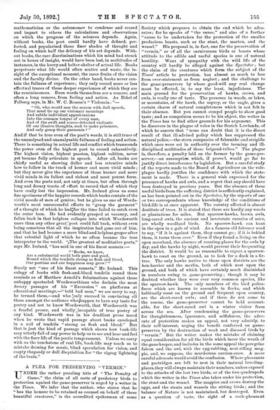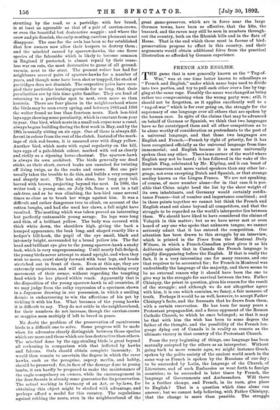A PLEA FOR PRESERVING "VERMIN"
T_INDER the rather puzzling title of "The Penalty of Game," the claim of all sorts of predatory birds to protection against the game-preserver is urged by a writer in the Times. We infer that the author, who states that he "has the honour to be retained as counsel on behalf of these beautiful creatures," is the accredited spokesman of some Society which proposes to obtain the end which he advo- cates; for he speaks of "the cause," and also of a further "cause to be undertaken for the protection of the smaller predacious beasts, such as the stoat, the marten, and the weasel." His proposal is, in fact, one for the preservation of "vermin," or of all the carnivorous birds or beasts whose attitude to the edible and useful species is one of natural hostility. Want of sympathy with the wild life of the country will hardly be alleged against the Spectator; but the claim of the creatures which form the subject of the Times' article to protection, has almost as much to lose from over-statement as from neglect ; and the challenge to the game-preservers by whose good-will any real change must be effected, is, to say the least, injudicious. The main ground for the preservation of hawks, crows, and owls, is really one of taste. The presence in woods, or lakes, or mountains, of the hawk, the osprey, or the eagle, gives a certain charm of natural completeness which is not felt in their absence. But you cannot compel people to show good taste ; and as compulsion seems to be his object, the writer in the Times has to find other grounds for his argument. This he discovers in the plague of voles in the Scotch Lowlands, of which he asserts that "none can doubt that it is the direct result of that ill-advised policy which has suppressed the natural police,—the stern companies of faloonidce and strigicice which once were set in authority over the teeming and ill- disciplined multitudes of these brigand-tribes." The plague is, therefore, a penalty laid on the farmer by the game-pre- server,—an assumpticrsi which, if proved, would go far to justify direct interference by legislation. But a careful study of the reports made to the Board of Agriculture on the vole- plague hardly justifies the confidence with which the state- ment is made. There is a general wish expressed for the presence of hawks and owls, and a regret that any should have been destroyed in previous years. But the absence of these useful birds from the suffering district is sufficiently explained, as has been pointed out in the Spectator, by the reports of one or two correspondents whose knowledge of the conditions of bird-life is at once apparent. The country affected is almost destitute of trees. It is stated that there are hardly any woods or plantations for miles. But sparrow-hawks, brown owls, long-eared owls, the ancient and inveterate enemies of mice, are wholly woodland birds. No sparrow-hawk can hunt in the open in a gale of wind. As a famous old falconer used to say, "if it is against them, they cannot go ; if it is behind them, it turns them over." Even if they found a living on the open moorland, the absence of roosting-places for the owls by day, and the hawks by night, would prevent their frequenting the district. It would be as reasonable to expect a sparrow- hawk to roost on the ground, as to look for a duck in a fir. tree. The only hawks native to these open districts are the hen-harrier and the merlin, both of which nest upon the ground, and both of which have certainly much diminished in numbers owing to game-preserving ; though it may be doubted whether they were ever very common species, like the sparrow-hawk. The only members of the bird police- force which are known to assemble in flocks, and which habitually roost on the ground and frequent open country, are the short-eared owls ; and if these do not come to the rescue, the game-preserver cannot be held account- able, for the short-eared owl is a winter visitor from across the sea. After condemning the game-preservers for thoughtlessness, ignorance, and selfishness, the advo- cate of protection makes an appeal, not very adroitly, to their self-interest, urging the benefit conferred on game- preserves by the destruction of weak and diseased birds by "vermin." But the writer makes the mistake of claiming equal consideration for all the birds which incur the wrath of the gamekeeper, and includes in the same appeal the peregrine falcon and the owl, with the egg-robbing, nest-rifling mag- pie, and, we suppose, the murderous carrion-crow. A more careful advocate would avoid the confusion. Where pheasants and partridges are left to nest in their natural breeding- places, they will always maintain their numbers, unless exposed to the attacks of the last two birds, or of the two quadrupeds which the writer in the Times also takes under his protection, the stoat and the weasel. The magpies and crows destroy the eggs, and the stoats and weasels the sitting birds ; and the balance of Nature is not maintained, but destroyed. Even as a question of taste, the sight of a cock-pheasant
strutting by the road, or a partridge with her brood, is at least as agreeable as that of a pair of carrion-crows, or even the beautiful but destructive magpie ; and where the crow and pie flourish, the early-nesting, careless pheasant must disappear. The ease for the owls has been so far established that few owners now allow their keepers to destroy them ; and the mischief caused by sparrow-hawks, the one fierce species of the falconidic which is likely to become common in England if protected, is almost repaid by their cease- less war on rats, the most destructive to game of all ground- vermin, next to the stoat. The present writer has had for neighbours several pairs of sparrow-hawks for a number of years, and though none have been shot or trapped, the stock of partridges does not diminish. The respective pairs have occu- pied their particular hunting-grounds for so long, that their peculiarities are by this time quite familiar. They are fond of returning to a particular spot to nest, even more so than kestrels. There are four places in the neighbourhood where the birds may be seen every spring, and between 1883 and 1888 the writer found no less than fourteen nests. Each hen-bird lays eggs showing some peculiarity, which is constant from year to year. One bird, which nests in a small oak-copse near a canal, always begins building during the first week in May, and by the 19th is usually sitting on six eggs. One of these is always dif- ferent in colour from the rest of the clutch. Instead of the mark- ings of rich red-brown, it is smeared over with dingy yellow. Another bird, which nests with equal regularity on the hill, lays eggs of a pale-bluish colour, marked with red as clearly and richly as a ripening horse-chestmat. The sparrow-hawk is always its own architect. The birds generally use dead sticks, as their short, curved beaks are unsuited for twisting off living twigs, as do the rooks and crows. But one pair usually takes the trouble to do this, and builds a very compact and shapely nest. The hen sits close, her long grey tail, barred with brown, projecting beyond the nest. In 1886, the writer took a young one, on July 5th, from a nest in a tall oak-tree, and as he was climbing, the hen-bird came several times so close as to brush her wings against him. It was a difficult and rather dangerous tree to climb, on account of the rotten boughs, and had she used her claws, a fall might have resulted. The nestling which was taken proved an interesting but perfectly untameable young savage. Its legs were long and thin, of a brilliant yellow. The body was covered with thick white down, the shoulders high, giving the back a humped appearance, the beak long, and shaped exactly like a hedger's bill-hook, the pupil of the eye small, black and intensely bright, surrounded by a broad yellow iris. The flat head and brilliant eye give to the young sparrow-hawk a snaky look, which is very unprepossessing. Until nearly full-fledged, the young birds never attempt to stand upright, and when they wish to move, crawl slowly forward with bent legs, and heads stretched out in front of them. Even at this age, they are extremely suspicious, and will sit motionless watching every movement of their owner, without regarding the tempting food which he has placed within reach. Apparently that is the disposition of the young sparrow-hawk in all countries, if we may judge from the sulky expression of a specimen shown in a Japanese drawing in our possession, in which a smiling daimio is endeavouring to win the affections of his pet by tickling it with his fan. What becomes of the young hawks it is difficult to say. They do not settle in the neighbourhood, for their numbers do not increase, though the carrion-crows or magpies soon multiply if left to breed in peace.
No doubt the problem of the preservation of carnivorous birds is a difficult one to solve. Some progress will be made when its advocates clearly distinguish between those species which are more and those which are less destructive than others. The mischief done by the egg-stealing birds is great beyond all reckoning in comparison with that inflicted by hawks and falcons. Owls should obtain complete immunity. It would then remain to ascertain the degree in which the rarer hawks, such as the peregrine, osprey, merlin, and hobby, should be preserved; for, in face of the damage dane to young lambs, it can hardly be proposed to make the maintenance of the eagle compulsory on owners, while its encouragement in the deer-forests is already some guarantee for its preservation. The actual working in Germany of an Act, or by-laws, for obtaining this object might be studied with advantage, and perhaps afford a model for this country. The regulations against robbing the nests, even in the neighbourhood of the great game-preserves, which are in force near the large German towns, have been so effective, that the kite, the buzzard, and the raven may still be seen in numbers through- out the country, both on the Rhenish bills and in the flats of Hesse. That is the end which those most in favour of bird- preservation propose to effect in this country, and their arguments would obtain additional Mice from the practical illustration so afforded by German experience.



































 Previous page
Previous page